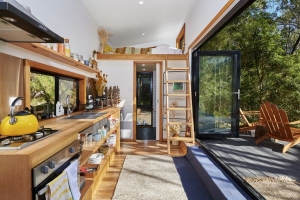The Tiny Houses movement appeared many years ago but has become increasingly popular in the last two decades. This way of life implies a lot of changes in your life. In this blog, you will read the main benefits of owning a tiny house: a new lifestyle, the eco-environmental benefits, and the financial benefits. There are four reasons you might want to consider a tiny house.

Benefits of A New Way of Life
Simplifying is starting to get rid of items. Moreover, be realistic of your needs regarding what type and size of the furniture are needed according to space.
Freedom, in this case, means letting go off the material possessions. Do you need all the stuff you are surrounded by?
Embracing a smaller space. More free time for yourself. Many retirees travel the country in RVs, but a Tiny House ”feels like a real home” on wheels.
Better Social Life and Less Stress. This means having fewer burdens which lead to less stress. Every choice one makes with this lifestyle is an opportunity to save costs associated with it.
Tiny Houses are more environmentally friendly to build
First, it is understandable that building a micro house requires fewer materials. An ordinary house may need several truckloads of lumber while a tiny house, which measures an average of 400 square feet, will only need half a truckload. This means fewer trees need to be cut down and less fuel will be used in transporting the materials.
The low impact living made of reclaimed materials and natural resources to meet basic needs on a small scale and in response to eco-friendly solutions, local expertise, you can build the tiny house of your dreams. Other benefits include independent of electricity, water-based infrastructures and demonstrates the potential for how housing might evolve in an eco-sensitive world.
On the plus side, fewer materials will be needed to replace those in a tiny house; therefore, it will cost less money. For example, due to its small size, a micro-house will usually have only one bathroom, this means there will be fewer fixtures to repair and replace compared to a standard home. The replacement cost will average 36% compared to a regular size house. Are you aware that it requires less “electrical” fixtures? The average tiny house has six light bulbs, compared to fifty in a larger dwelling. You need less to fully function. You can install a compact water heater that will fit anywhere in your tiny house.
Since it is small in size, it consumes less energy. According to Colby College, the average-sized house uses around 12,773-kilowatt-hours of energy per year; while a micro house consumes 914-kilowatt-hours annually.
Besides, owning a tiny house could go a long way to reducing your carbon emissions. A tiny house will emit 2,000 pounds; whereas, an average-sized house will produce 28,000 pounds of greenhouse gas emissions every year.
It is well known that tiny homes use less energy. The simple reason is that there is less space to heat and cool due to its size and open space concept. Another reason is that fewer electrical appliances are needed. Your kitchen will be downsized; therefore, there is no need to install a big fridge or stove. Some customers opt-out of installing a dishwasher since they prefer doing the dishes by hand.
More affordable to buy and maintain
If you are willing to use reclaimed or recycled materials to build your tiny house yourself, it will be very affordable. Many people have built their tiny house for less than $30K. In Quebec, it is possible to buy your custom-made tiny house for a price range from $50K to $85K. Within this price bracket, you can buy a house that accommodates between 5 and 7 people.
You could design your tiny house to make it off-grid. Solar panels, gas appliances, and composting toilets are some ways to reduce your energy bill. According to Hydro-Quebec (Canada), a regular house needs on average 70 solar panels to cover its needs, and many tiny houses need as few as 5-6 panels. If you live in an area where the climate is milder, maybe you won’t need as much insulation as we may need, which would lower the cost of building and maintaining your tiny house. Interestingly, if you produce too much electricity for your house, it is possible in many places to resell it to an energy company, so your solar panels could generate income.
A smaller financial burden
Have you thought that owning your tiny house is putting money in your pocket and not in someone else’s pocket? Imagine having a lower energy bill, or even getting money from the energy company. Visualize being able to work part-time because your lifestyle allows you to earn less to support yourself and your family, so more free time for hobbies and life experiences.
Living Big in A Tiny House
In summary, you are presented with a unique opportunity to design a lifestyle that is all about you.
You can bring back freedom by going off the grid and going tiny.
Will you be envious of this lifestyle? Doing the things that you love, having more time and money? Time is the most important thing in your life by being able to spend time with the people that you love, your family and friends. Doing the things that you love. It just gives you a new outlook on your life.
The change is easy. It is much like a breath of fresh air. It is building so much more than just a home. More travel, more adventures, and more financial freedom.
Fill your Tiny House and your future with promises.
